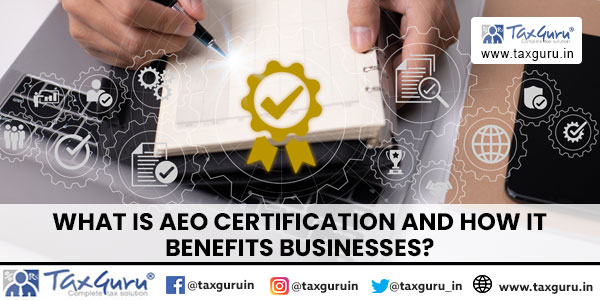Summary: The Authorized Economic Operator (AEO) is a certification granted by customs authorities to businesses meeting specific criteria related to international supply chain operations. Introduced in 2011 by the CBIC, the AEO program aims to enhance security and facilitate trade by ensuring businesses comply with customs regulations. The program follows the World Customs Organization’s Safe Framework of Standards. There are three levels of AEO certification for importers and exporters: AEO-T1, AEO-T2, and AEO-T3, with AEO-T3 offering the highest benefits, such as faster customs clearance. Businesses involved in logistics, customs brokerage, and warehousing can apply for the AEO-LO certification. AEO certification is voluntary, but it offers several advantages, including faster customs clearance, reduced inspections, international recognition, and deferred duty payments. Eligible businesses must demonstrate financial solvency, security measures, and a good track record with customs authorities. The certification process involves submitting an application, a review of business operations, and possibly an audit. The certification is valid for three to five years, depending on the level of accreditation.

What is AEO?
The Authorized Economic Operator (AEO) is a designation granted by customs authorities to businesses that meet specific criteria related to their role in the international supply chain. It is implemented by Directorate of International Customs of CBIC.
The AEO Programme was introduced as pilot project in 2011 vide Circular No. 37/2011- Customs dated 23rd August, 2011.The same was amended and the revised final AEO programme was introduced vide Circular No.28/2012 dated 16.11.2012.
The application process for AEO-T1 accreditation was further simplified to two Annexures form only by Circular No. 26/2018 dated 10.08.2018 from five Annexure form as was stipulated in Circular No. 33/2016 dated 22.07.2016. Web based On-line application filing processing for AEO-T1 status started from December 2018 vide Circular 51/2018 dated 07.12.2018.
Objectivity of AEO
The AEO Programme is focussed on twin objectives of facilitations of Importers, exporters, logistic operators and enhance security in the international supply chain and is based on World Customs Organization’s Safe Framework of Standards to secure and facilitate global Trade.
How to avail get it?
The entity is granted AEO status by way of certification.
AEO certification is part of the World Customs Organization’s (WCO) SAFE Framework of Standards, aimed at enhancing international trade security and simplifying customs procedures.
Who can avail AEO?
Below can avail AEO :
Economic operators established in the customs territory of the Community who carry out activities related to customs operations;
Non-EU economic operators if there is a mutual recognition agreement of the AEO certificate between the Community and the third country where the applicant is established;
Non-EU air or maritime companies that have a local office or benefit from customs simplifications.
Is AEO mandatory for businesses involved in the supply chain?
No. The AEO scheme is purely an optional scheme.
What is the structure of Indian AEO programme?
There is a three-tier programme for importers and exporters i.e. AEO-T1, AEO-T2 and AEO-T3 in the increasing degree of benefits accorded and compliance requirements. AEO T3 being the highest level. AEO T3-certified businesses receive the fastest clearance of their goods.
Furthermore, there is single Tier AEO Programme for Logistics Providers, Custodians or Terminal Operators, Customs Brokers and Warehouse Operators who are granted AEO-LO certificate.
What is the validity period of AEO status?
The validity of AEO certificate is three years for AEO-T1 and AEO-T2, and five years for AEO-T3 and AEOLO.
What are the advantages of AEO certificate?
1. Security and Compliance: AEO-certified businesses are considered low-risk in terms of customs compliance, security, and safety standards. The certification demonstrates that the company meets the highest standards for customs compliance, security practices, and financial stability.
2. Benefits:
- Faster customs clearance: AEOs enjoy priority treatment at customs, resulting in quicker processing times for shipments.
- Reduced inspections and audits: AEOs are less likely to face physical inspections or audits.
- International recognition: AEO status is recognized by customs authorities worldwide, making cross-border trade smoother.
- Enhanced reputation: Being certified as an AEO can enhance a business’s reputation with customs authorities and trading partners.
- Reduce costs: AEO-certified businesses can save money due to fewer delays and simplified documentation.
- Deferred duty payments: AEO-certified businesses may be eligible for deferred duty payments.
- Direct port delivery: AEO-certified businesses can take advantage of direct port delivery and entry.
What is eligibility criteria for availability of AEO?
Businesses need to demonstrate that they meet several criteria, including:
- Financial solvency.
- Compliance with customs regulations and other related laws.
- Proven safety and security measures.
- A track record of good standing with customs authorities.
What is certification process for obtaining AEO?
1. Certification Process: The process to become an AEO typically involves an application to the customs authority, a detailed review of the business’s operations and procedures, and sometimes an audit. If the company meets all the required criteria, it is granted AEO status.
In summary, being an AEO can streamline customs procedures, reduce costs, and enhance a company’s position in the global supply chain by demonstrating trustworthiness and compliance with international standards.




